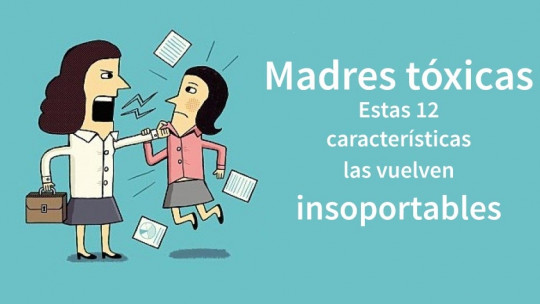Toxic mothers can undermine our self-esteem and cause constant conflicts. Knowing how to identify them, improve communication and find solutions to improve the relationship is possible.
There is only one Mother but, sometimes, this figure is not entirely as we would like it to be or as we have been sold it should be and ends up being. toxic mothers that make a healthy relationship very difficult.
At the end of the day, mothers are also people with their virtues and defects, their lived experiences and their personalities and they are not perfect, although putting it on the table sometimes means breaking a taboo. But what is a toxic mother? What consequences do harmful mothers In our life? How to face them?
When we talk about toxic relationships we usually refer to friendships or romantic partners and the most common recommendation is to stay away from them, but in the case of toxic mothers or siblings, mothers-in-law or relatives, that does not always seem to be a very viable option. Let’s see what can be done to be aware of the situation and assume it in the best way.
How do you know if your mother is toxic?
The first step on how to know if you mother is toxic It is thinking about what the relationship has been like in the past and currently, how it has influenced our personality and behaviors and how it continues to do so. There is no need to doubt a mother’s love but many times, behind a toxic attitude lies a lack of self-esteem, a notable insecurity and a deep fear of loneliness, preventing her children from being self-sufficient so that they do not leave her side.
According to psychologists, there are a series of attitudes of mothers with their children which can be a sign of toxicity that we must confront. Among the most common, we can highlight the following.
- Messages of guilt or shame: This type of attitudes of toxic mothers They can start from childhood and involve trying to blame their children for their mistakes, attributing them to a defective nature. So much so that they can become psychologically abusive mothers because children can integrate these messages as self-criticism, making it seem like problems of self-esteem and insecurity.
- Shame and guilt: This may begin in childhood, magnifying small mishaps into large-scale disguises in front of other people or simply blaming the daughter for her mistake by attributing it to her flawed nature; shame is highly personalized and is usually expressed as “You always” either “You never“If done frequently enough, the child internalizes these messages in the form of self-criticism, the habit of mind that attributes errors or failures to fixed character defects; this habit becomes a fixed element that lasts into adulthood until recognized and addressed. In fact, people who live with these types of mothers Those who make these statements usually end up in adulthood with a very self-critical attitude towards themselves.
- Victimism: Victimhood is another way in which harmful mothers They act on their children. A victimizing mother usually uses everything they have done for her children to manipulate them and do what they want them to do. These types of attitudes are usually done by controlling mothers or possessive mothers to try to get their children to pay more attention to them or to do tasks.
- Constant comparisons : Comparisons, in all cases, are odious. The children with manipulative and victimizing mothers They tend to be constantly affected by comparisons with other people. These can occur between siblings, friends, cousins, neighbors, and are usually negative in nature. With these types of attitudes, toxic mothers can cause a lot of damage to the mental health of their children.
- Passive aggression : Passive or covert aggression usually occurs when mothers who are harmful They try to do harm with words or their attitudes. In this way, there is no need to hit or yell to harm their children, what they do is simply try to be hostile towards them.

- Constant manipulations : Obviously the manipulative mothers They are also within the toxic signal. Some actions that an emotionally manipulative mother can do is to confuse her children about her words (such as saying that she has not made some promises, or that they do not remember some dialogues) or actions. This ends up harming children or adults who suffer from this behavior since people may end up distrusting their own emotions and thoughts.
- They laugh at you: One of the worst ways in which a abusive mother can act with your children is by making fun of some of the actions they can do. By laughing at your children’s feelings, thoughts or actions, this can end up causing the person who receives this ridicule to end up feeling hatred towards themselves.
- They are stone walls : The toxic mothers They can also be when they do not speak or refuse to respond to their children’s words. In some cases, mothers are harmful by not letting their children talk to them openly about their feelings and thoughts.
Logically, not all of these reactions are useful to know if you mother is toxic Not all mothers are the same nor do they cause the same effects; they always depend on the moment, the intensity, whether they are continued over time, the context and the type of person. However, these are some of the signs of a toxic mother but there are many more. If you identify this type of attitude in your mother and think it may affect you, it is important to consult with a professional psychologist.
Why is my mother toxic?
Mothers are a fundamental pillar in the formation of children from even before they are born. With breastfeeding, attachment, parenting practices and education, the cognitive, emotional and behavioral foundations of the future adult are formed, which interact with the child’s own personality and character.
Thus, the early relationships of the child/mother are of vital importance for the construction of the human mind. In them, love, affection, the formation of values, personal development, the impulse to socialization, independence and all the resources that minors need to become adults in society are presupposed. For this reason the narcissistic mothers or overprotective mothers as well as any of the attitudes described in this article, can have many effects on the Psyche of the kids.

But this is not always the case and these values and relationships are not always positive and favorable. The characteristics of toxic mothers They are based on the fact that they voluntarily or involuntarily project negative aspects that limit the well-being of their descendants, dump their fears and insecurities, manipulate their emotions, put the responsibility for their happiness as mothers on them and even cling to total control of their lives. without letting them develop freely.
Types of toxic mothers
There are many types of toxic mothers although each one can show several of the others’ characteristics or all at the same time. However, as we have mentioned, adopting any of the characteristics that we discuss below does not mean toxicity in itself, but it does mean that it is necessary to assess as a whole the effects it has caused on the development of the child’s personality and how it affects daily life. and in relationships with the environment, with oneself and with others.
Overprotective mothers
The overprotective mothers They do not give enough value to their children’s abilities both when carrying out a task, a job, studying or a function and when defending themselves from possible dangers or difficulties. These attitudes come from a controlling spirit and the mother’s own insecurity. Some phrases from toxic mothers in this sense can be “let me do that thing that you don’t know”, “you are not capable”, “be careful, I don’t trust you”.
These types of characteristics of toxic mothers can cause low self-esteem and lack of self-confidence in the child since he was little that he will carry when he is an adult. You also have difficulties facing new challenges and getting out of the situation. comfort zone
controlling mothers
This type of controlling toxic mothers They show a need to control both their own lives and those of their children. They control their friendships, their habits, their way of dressing, how they behave, and everything that surrounds them. This controlling personality creates security in the mother and she grows in the belief that it is a form of love and wanting good for her descendant, even going so far as to cross certain limits of interference, jealousy and envy when they are adults. As children, this control also implies overprotection and weakness in children, which causes insecurities and inferiority as well as nullifying the ability to make their own decisions autonomously.
Some controlling mother phrases They tend to be along the lines of “I want the best for you”, “you will be wrong if you don’t do what I tell you”, “who are you going with, where, when will you be back, call me right away”.
Emotionally manipulative mother
The manipulative mothers They are more common than we think. Normally these are women who are not satisfied with their lives, they are afraid of not being loved or of losing their maternal role, so they want to attract them through emotional dependency he emotional blackmail or coercion. They know how to use emotions and words to achieve their goals, even if the happiness or well-being of others is at stake.
Additionally, an emotionally manipulative mother tends to be very criticism, to be a liar, to undervalue the virtues of children and to maximize the defects always focusing on what is done wrong and calling out the possible (or imagined) absence of dedication and affection. An example of this is not valuing what is done for her and conveying that it is her obligation. When you are a child, not feeling validated or not feeling good enough for your mother can leave an indelible mark on your child, such as feelings of guilt or the need for approval from others.
Emotionally manipulative mothers can also include: victimizing mothers who use complaints to reach their children and make them pay attention almost by force. A victimizing mother recreates herself in your difficult life, your delicate health or that you have had bad luck as another way of manipulate to achieve their objectives and undermine, often unintentionally, the will and independence of others. Extreme pessimism is also another form that these types of toxic mothers develop.
Narcissistic toxic mother
A narcissistic toxic mother meets the characteristics of the Narcissistic personality disorder which focuses on the egocentrism and high self-esteem as well as little empathy towards their descendants. Furthermore, she always seeks to be the center of attention, she cares about appearances and needs to feel admired as a model mother who does everything perfectly.
Narcissistic mothers are never satisfied and no matter how hard children try, they will hardly find words of admiration or comfort for their mothers who will always minimize or ridicule the concerns of their descendants in comparison to their own. These types of toxic mothers consider their children as an extension of them and pour all their ambitions, unfulfilled projections and aspirations onto them, regardless of how they feel or what they want in their life. On the other hand, they can also become extremely destructive, both with their children and with the people around them, be it a partner or friends.
Toxic family: characteristics
Although we are talking about the case of toxic mothers , this effect can occur in any member of the family such as the father, grandparents or siblings. Having a toxic family implies that there are patterns of behavior that cause emotional problems or that dysfunctional roles have been assumed between the different members over the years and that have marked the growth of children and their formation as adults.
As in the case of mothers, characteristics of a toxic family They also reside in constant conflicts, the absence of any type of dialogue, manipulation, lies and deception, and harmful strategies to achieve something such as blackmail. All of these ways of relating can lead to total isolation or distancing from the family as well as situations that do not allow for a peaceful life with maximum well-being.
Another situation that can also arise is to have aa toxic in-laws or a toxic mother-in-law that makes the relationship difficult and even seriously harms the couple. Both in the case of toxic families and in that of toxic mothers-in-law or other relatives, the solution to the problem will be to follow the same steps that we discuss below.
How to get out of a toxic mother
The first step to get out of a toxic mother is realizing that it is. Children of toxic parents usually carry weights that do not belong to them and that have modulated their personality in a certain way. Likewise, in the most extreme situations, these children may develop some type of disorder or emotional disorder that makes it even more difficult for them to face their difficulties. Thus, once we have analyzed the types of toxic mothers that exist, if we discover that we find ourselves in any of the cases, it is advisable to focus on the solution and some of them are:
- Improve communication: talk about possible conflicts and how we feel about them in a sincere way and practicing active listening also towards the other party.
- Exercise assertiveness: recognize one’s own rights, learn to say no, set limits and defend them in a clear and direct way without fear of possible consequences.
- Assume the role you play: as a son or daughter, in no case act as a father or mother or protector. This also implies not overloading yourself with responsibilities that do not correspond.
- Avoid emotional dependence: promote self-esteem and one’s own decisions by assuming the role of adult responsible for one’s own life and the steps to take in each phase.
Professional help to improve the relationship
If with all this it is not achieved get out of a toxic mother the next step to do this is to seek professional help from a psychologist specialized in family therapies to help relocate the roles and relationships within the family, specifically between the mother and the son or daughter.
The family therapy conceives the family as a whole, a system in which each person interacts with the others. To do this, the psychologist encourages communication and empathy to understand the discomfort that certain attitudes generate in others and so that both individual and interpersonal problems between the mother and children can be resolved.
In the therapy process, and depending on the needs and depth of each case, it is possible that both joint and individual sessions take place both to analyze each member separately and to share different perspectives and shared emotions. In the event that the toxic mother For example, if you do not agree to attend therapy, it is always advisable to do it individually in order to learn how to treat it, change the aspects that we do not like about our own attitudes and be able to face the relationship in a healthier way that does not involve stress and anxiety.
In any case, have a toxic mother It is a problem so the best thing to lead a full life and a happy relationship is to try to solve it in the best way by accepting and facing it with all the difficulties.









